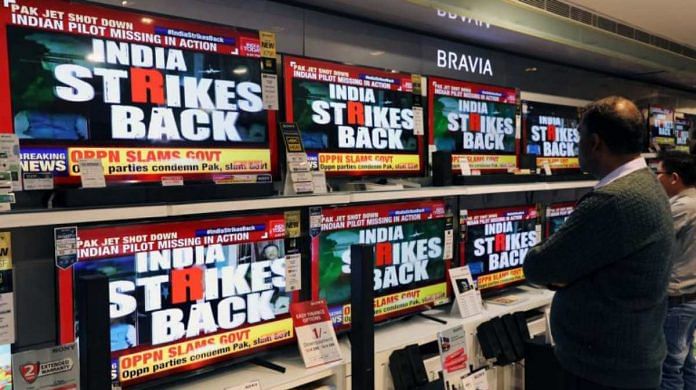New Delhi: Two and a half months since the Broadcast Audience Research Council (BARC) suspended weekly publishing of ratings for news channels amid ‘fake TRP’ row involving Republic TV and others, industry experts said the “short-term suspension” might not have had “significant impact” on the revenue of the channels.
However, they agreed the impact would be serious if BARC continued with the suspension for a longer period of time.
BARC’s viewership data used to generate a mad rush among channels every Thursday to announce their popularity to viewers and advertisers.
In October, BARC decided to suspend releasing the weekly viewership data for channels in the news genre — a week after the Mumbai Police claimed that Republic TV and two other channels have been manipulating television rating points (TRP) data.
At the time, BARC had said the suspension would continue for eight to 12 weeks, until its technical committee reviews and augments the current standards of measuring and reporting the data of “niche genres”. BARC had said it was looking to improve its “statistical robustness” and significantly “hamper the potential attempts of infiltrating the panel homes”.
Last month, the Ministry of Information and Broadcasting constituted a four-member committee, headed by Prasar Bharati CEO Shashi Shekhar Vempati, to review the existing guidelines on television rating agencies.
Asked when BARC will start releasing the data again, a spokesperson told ThePrint: “The review with the technical committee is ongoing and we will intimate our stakeholders and the media at the appropriate time.”
‘News has become more of an entertainment’
Sai Nagesh, CEO of communications firm Tempus Fugit, said this blackout of viewership news data might not have impacted revenues for news channels.
“With news becoming more of an entertainment in nature, the channels have imbibed the spirit of the GEC (general entertainment channel) genre and thus, advertisers know that they will continue to catch the attention of the viewers,” he told ThePrint.
Nagesh said news had never been a high viewership genre, except during the lockdown period when it saw a rise in viewership.
“News channels were anyway not chosen only on the basis of ratings. Factors like frequency-build and lower costs too play an important role in their selection. The basic reach happens through GECs,” he said. Frequency-build refers to the frequency of ads being shown through a channel.
“As far as the mad rush for viewership data for every Thursday is concerned, it is more among the channels themselves as compared to the advertisers or media planners,” he added.
Also read: Arnab Goswami vs rest: How TRPs can be fixed, and why TV news is caught in a vicious fight
‘Pricing in news channels remains standardised’
Sources in multiple news channels claimed the data suspension did not impact their revenues in a big way.
A senior executive of an English news channel said the absence of BARC’s viewership data did not have much of an impact as advertisers look at the total viewership volumes released by the BARC and also use previous data to some extent.
Unlike general entertainment channels (GECs), he added, there is no 100 per cent correlation between pricing and ratings for news channels.
“The pricing in news channels remains standardised. It takes years for news brands to establish themselves and fix their pricing, which is dependent on multiple factors such as quality, brand, distributor demand, among others,” he explained.
Asked about how channels get viewers’ feedback in the absence of BARC ratings, a top executive of another news channel said certain channels use tools like Zapr that claims to give real-time TV viewership data.
“Moreover, social media engagement is a great parameter to know the actual audience engagement,’’ he said.
News channels also said they do not change content every week based on data, unlike GECs.
“Certain events do generate a spike in viewership, but by and large, channels maintain a status quo,” said a senior executive of a third news channel.
“The Covid-19 vaccine, Bengal elections and the farmers’ agitation are major news events at present and news channels would continue their focus on them without going for frequent knee-jerk reactions,” he added.
Not the first time
Talking to ThePrint, Ashish Bhasin, CEO Asia Pacific and chairman, India, Dentsu Aegis Network, a London-headquartered multinational media and digital marketing communications company, said while it is always good to have the latest viewership data handy, these were exceptional circumstances, and the industry is hoping there will be a solution and BARC will soon release the data.
“But without the data, there isn’t a significant impact in the short term as media campaigns are planned in advance,” he said.
“If there is a complete absence of data for a longer time period, say one year, there could be a sizable impact,’’ he said.
Paritosh Joshi, principal, Provocateur Advisory, an independent media and communications consultancy firm, and former advertising professional, told ThePrint that this blackout would not affect either the advertisers or the channels revenues, simply because television viewership habits are not that volatile.
He added that there have been other data blackouts in the past too, such as when broadcasters migrated to BARC from TAM Media Research in 2015.
Also read: Why TRPs are important for broadcasters, and are also prone to ‘manipulation’



